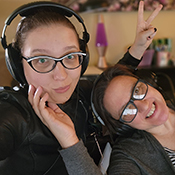 Some of you may have noticed I’ve been a bit occupied this year – I’m still working on resurrecting the classic Gender Analysis website, and I’m also mostly avoiding getting in pointless fights with terrible people on Twitter all. day. long. Why? Well, I’ve got something else going on: I finally started college this January.
Some of you may have noticed I’ve been a bit occupied this year – I’m still working on resurrecting the classic Gender Analysis website, and I’m also mostly avoiding getting in pointless fights with terrible people on Twitter all. day. long. Why? Well, I’ve got something else going on: I finally started college this January.
This is especially significant for me given my past experiences with the educational system and how this ended up influencing the course of my life. As a child, I was accelerated two grades ahead, and so I started high school at 12, which ended poorly with lots of bad memories and trauma. Whether from puberty and the accompanying onset of severe depersonalization and depression, living in an unsafe household for years while my mother tried to finalize her divorce from my violently erratic ex-stepfather, simple emotional immaturity and unreadiness for the high school environment, or some combination of these, my time at high school turned into a slow-motion trainwreck of conspicuous failure, disappointing and enraging pretty much every adult in my life. When you’ve been skipped ahead multiple grades due to supposed “giftedness”, this is something everyone expects will continue to manifest itself; it was always clear that I was expected to do well academically and then go on to college, even though doing just about anything was already increasingly difficult, and the prospect of going through two more years of high school was just unimaginable. After years of being berated about this at length on a daily basis and hauled to a succession of unhelpful therapists, I dropped out at 14 due to being wholly unable to function at school, which was honestly a relief to me – I just wanted it all to end. I later got my GED at 18, but I never again wanted to be subjected to anything like what I’d been through.
Unfortunately, this entire experience would become a major source of frankly pathological insecurity for me in adulthood. I was increasingly fixated on scraping together validation in other ways and from other places, wondering if anything I did would be enough to make my family proud of me instead of disappointed, and compulsively evaluating myself against the standard of whether I was a person who could succeed at college. This had been going on for more than a decade – I once described the trauma of dropping out of high school as essentially the axis my entire life rotates about – and I wasn’t really getting anywhere in struggling with this; the issue just seemed to entrench itself deeper. Finally, I was forced to realize that I had attempted everything else other than the most obvious thing: facing this directly, and actually going to college and seeing what happened. I would turn 30 in April, and having this what-if hanging over me for the next several decades of my life was clearly untenable.
As it turns out, Florida’s community college system was an option that was readily accessible to me, and I was able to take the placement exams, enroll, and register in time for the 2019 spring semester. I was still incredibly tense and nervous in the weeks before classes started – this was more or less a complete unknown to me, and I had no sense of what the experience would be like. Being on a college campus, as someone who belonged there as a student rather than just a visitor using the library, was a feeling that took some getting used to, and yet it was incredibly affirming and felt simply right for me. If anything, I was overprepared for the initial required courses – I had come into this ready for the possibility that I would basically be playing on academic nightmare mode, but it turns out that courses like Composition I (and particularly the more general “intro to being in college” course all new students have to take) aren’t especially difficult. There were times when I felt that the course materials and assignments could be much faster paced, but for many others in the class, the current pace was clearly challenging enough. My professors were a genuine joy to be around, and weren’t judgmental at all towards those of us who started college later than most – these were fellow adults I could talk to as equals. They were happy to have me there. I was happy to be there.
Socializing with other students was so much different from my previous experience. Rather than being a couple years younger than other high schoolers and facing de facto exclusion and disinterest from people who were far ahead of me developmentally, I was now a decade older than most of the other students at college. This made it something to look forward to rather than something to dread: it turns out that over the years, I had become significantly more comfortable just being open and expressive, and not worrying as much about what other people think of me. Apparently I don’t always look 30, because almost everyone there was surprised to find out that I’m raising a teenager and I’ve been with my wife for eight years. But this didn’t pose any obstacle to making lots of new friends – I was surprised to find that I was so outgoing around others that it was obvious I had been needing an outlet for it, and just getting out of the house and mingling several times a week left me feeling refreshed and energized rather than depleted. We got to know each other, worked on projects together, and had an unexpectedly fantastic time together throughout the semester.
In particular, I’d like to take a moment to point out something that was an extremely important part of all this: the degree to which today’s college-age population, even in Central Florida, is accepting of trans and queer people. On campus, there were more trans people than I’d seen anywhere outside a pride parade or Day of Remembrance event – I wasn’t a singular anomaly there. And no one was at all taken aback when I told them I was trans; it simply wasn’t an obstacle to normalcy in our interactions. Online, I had become accustomed to constant hostility and attacks, forced into a position of feeling I always had to defend my mere existence. At college, I learned what it felt like to be able to just be an unremarkable and accepted person in the same way that cis people are always treated. There wasn’t any fear or anxiety surrounding it, and it was a space where I could let my guard down and be myself. No matter how much some may decry “safe spaces” on campuses for LGBT people, this attitude seemed to be nothing but a good thing for all of us: we could function as peers and colleagues, able to be open and relaxed with one another without transphobia or homophobia getting in the way of that. This was clearly preferable to an unsafe space where any interaction runs the risk of being rejected or viewed with suspicion due to an irrelevant aspect of who you are. I had understood the value of safe spaces abstractly, but I now understood this intuitively as well. It’s easy to criticize the notion of a safe space when it’s something you have no personal stake in, and it’s easy to view them as unnecessary, unimportant, or excessive when the entirety of society is effectively already a safe space for you as someone who’s white, male, straight, or cisgender. That level of default acceptance had hardly ever been available to me, and the difference was all the more noticeable for it.
Here’s what I’ve learned so far: This has been absolutely nothing like my experience of high school, and I wish I had known that for all those years. College is something I can do, and more than that, it’s something I can excel at – and I feel so good about that! It’s been an incredible relief to find that after I eliminated the factors in my life that were holding me back – gender dysphoria, depression, a terribly stressful home life, and so on – I really am someone who can succeed at college. I managed a 4.0 during my first semester there, and happily registered for five more courses during the shortened summer term. Even the remedial offerings of the mandatory new-college-students course, between tedious (for me) exercises in note-taking and sending professional emails, took a genuinely helpful turn: I had the opportunity to give serious thought to which major and which career field would be most suitable for me. And it turns out the social sciences are something I really enjoy more recreationally and can’t see myself doing for a living in the long term – instead, I’m currently working toward getting my MS in biostatistics. Most of all, I feel that this is helping me to become a better person. It adds structure to my life, it pushes me to practice my skills frequently and cultivate discipline and work ethic, and it gives me something concrete to work towards for myself and my family. Getting good grades and praise for my work from professors is extraordinarily validating for me in a way that almost nothing else is, and I feel less compelled to desperately grab at validation from elsewhere – this was clearly something significant that had been missing from my life, something essential to who I am as a person. I’m unequivocally glad that I finally decided to make this happen. ■




Pingback: Notes on my first two years at college as an adult learner | Gender Analysis